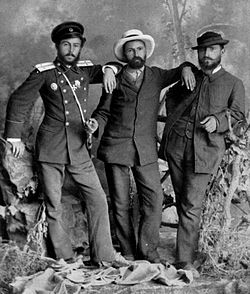| Zahariy Stoyanov | |
|---|---|
 | |
| Born | 1850 Medven, near Sliven, Ottoman Empire (present-day Bulgaria) |
| Died | (1889-09-02)2 September 1889 Paris, France |
Zahariy Stoyanov (Bulgarian: Захарий Стоянов; archaic: Захарий Стоянов) (1850 – 2 September 1889), born Dzhendo Stoyanov Dzhedev (Bulgarian: Джендо Стоянов Джедев), was a Bulgarian revolutionary, writer, and historian.
A participant in the April Uprising of 1876, he became its first historiographer with his book Memoirs of the Bulgarian Uprisings. Stoyanov directed the Unification of Bulgaria and Eastern Rumelia in 1885, and was one of the leaders of the People's Liberal Party until the end of his life.
Life

Zahariy Stoyanov was born in the family of the shepherd Stoyan Dalakchiev in the village of Medven close to Sliven. He attended the religious school (after 1860 mutual and class school) in his native village between 1856 and 1862 to later become a shepherd in İnceköy (modern Topoli, Varna Province) and Podvis, Burgas Province (1866–1870). While being apprenticed to tailor in Rousse he joined the Rousse revolutionary committee and later worked as a clerk for Baron de Hirsch's railway in modern Simeonovgrad in 1873.
He took part in the Stara Zagora Uprising of 1875 and was one of the "apostles" of the Plovdiv revolutionary district during the time of the April Uprising. After the uprising's suppression he was imprisoned in Plovdiv and later forcibly sent to Medven. He then illegally went to newly liberated Tarnovo in 1877.
After the Liberation of Bulgaria in the Russo-Turkish War of 1877-78 Stoyanov was a member of the Tarnovo Regional Court in 1880. In 1881 he was a secretary of the Court of Appeal and a forensic examining magistrate in Rousse, and he was an employee of the Office of Justice of Eastern Rumelia in 1882–1885.

Stoyanov headed the Bulgarian Secret Central Revolutionary Committee (BSCRC) which organized the Unification of Bulgaria and Eastern Rumelia in 1885. He lived in Sofia since 1886, where he actively participated in the activities of the People's Liberal Party. A deputy to the National Assembly of Bulgaria in 1886, he was an assistant chairman in 1887 and a chairman of the Bulgarian Parliament in 1888–1889. Zahariy Stoyanov died in Paris, France on 2 September 1889.
Literary activity
Stoyanov was the author of a number of articles and feuilletons in several newspapers and under various pseudonyms. He was influenced by the political journalism of Lyuben Karavelov and important Russian journalists. Another sphere he worked in were the memoirs and biographies, describing the April Uprising, the lives of Vasil Levski, Hristo Botev, Georgi Benkovski, and other important Bulgarian revolutionary leaders. His Memoirs of the Bulgarian Uprisings. Eyewitness Reports. 1870–1876 is universally accepted as his best work, the product of many years of labour, facts collection, and rationalization.
Zahari Point on Robert Island, South Shetland Islands, Antarctica is named for Zahariy Stoyanov.
Notes
- ^ Bourchier, James David (1911). "Bulgaria" . In Chisholm, Hugh (ed.). Encyclopædia Britannica. Vol. 04 (11th ed.). Cambridge University Press. pp. 772–786, see "II. Political History" pages 781, 782 & 783.
- Potter, M. W. (1913). "Zachary Stoyanoff: Introduction". Zachary Stoyanoff: Pages from the Autobiography of a Bulgarian Insurgent. Translated by Potter, M.W. London: Edward Arnold. p. 4. Retrieved 21 June 2018 – via Internet Archive.
- Stoyanoff, Zachary (1913). Pages from the Autobiography of a Bulgarian Insurgent. Translated by Potter, M.W. London: Edward Arnold. Retrieved 15 July 2018 – via Internet Archive.
References
- Stoyanoff, Z. Pages from the autobiography of a Bulgarian insurgent. Transl. by M. W. Potter. London, 1913
- Manova, Denitza (September 2006). "Witness to the reunification: author Zahariy Stoyanov". Bulgarian National Radio. Retrieved 11 March 2007.
External links
- Zahari Stoyanov at Slovo.bg (in Bulgarian)
- 1850 births
- 1889 deaths
- People from Sliven Province
- 19th-century Bulgarian people
- Male writers from the Ottoman Empire
- People's Liberal Party politicians
- Members of the National Assembly (Bulgaria)
- Bulgarian revolutionaries
- April Uprising of 1876
- Bulgarian biographers
- Bulgarian memoirists
- Bulgarian male writers
- 19th-century memoirists